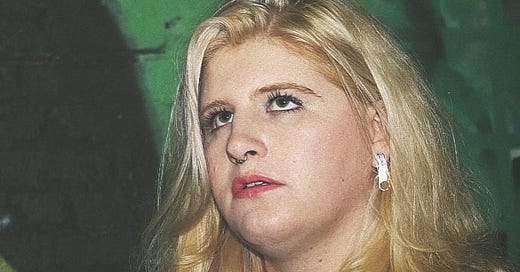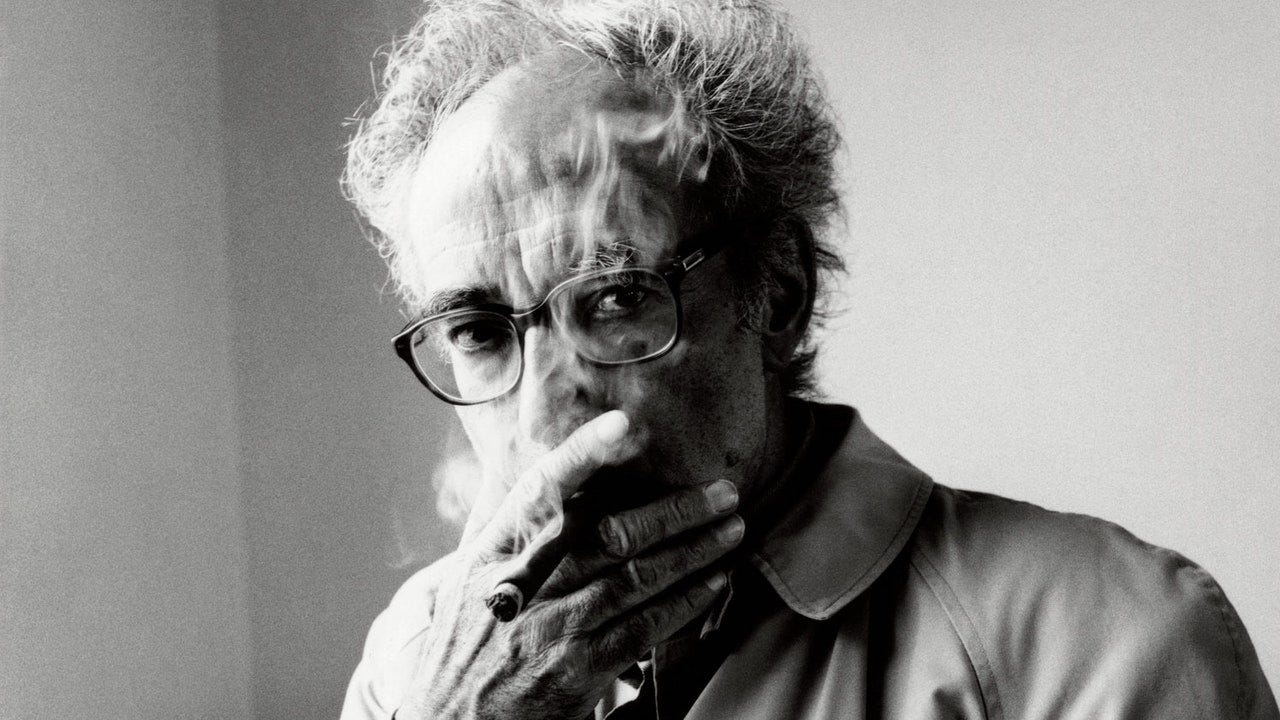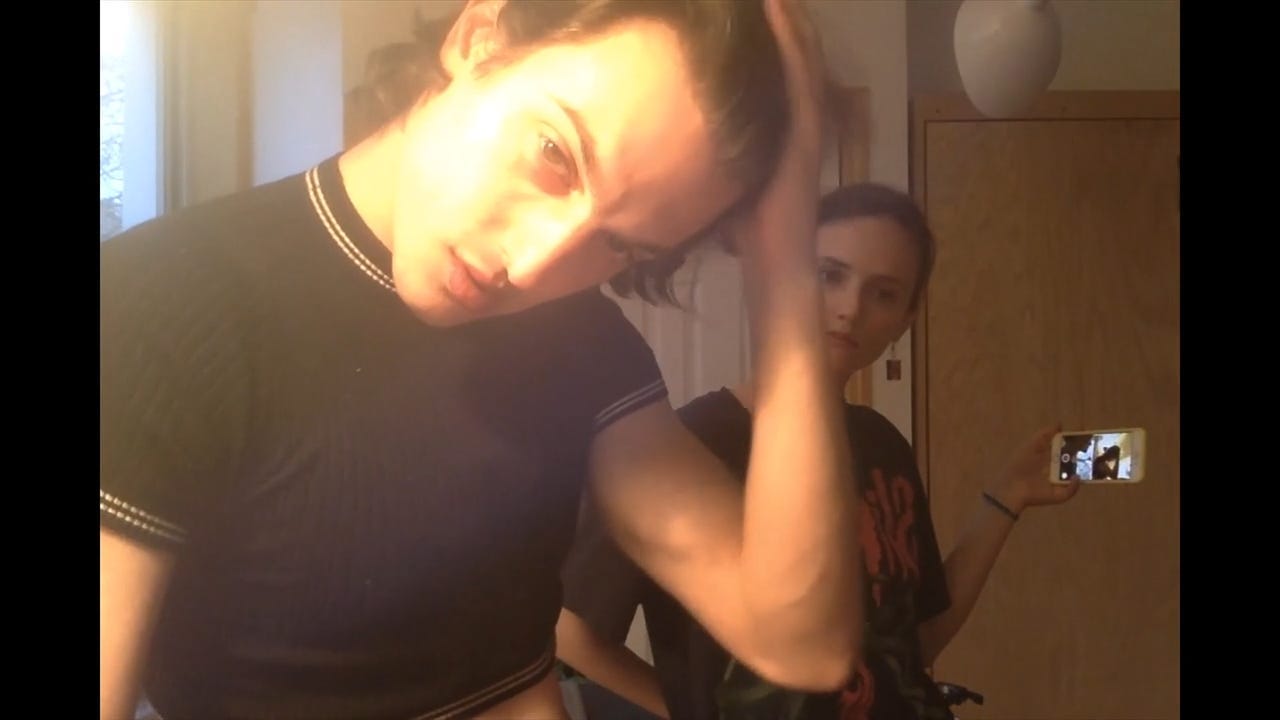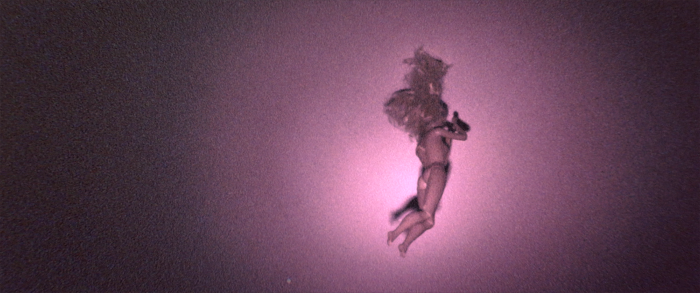CINEMA IS DEAD!!!
Jean-Luc Godard killed himself on September 13th. He was exhausted. I can relate.
Godard’s death hit me hard. I loved Godard, I loved his cinema, I loved his writing and his cinephilia. I read somewhere long ago that when Godard taught film school in the late 80s that nobody went to his office hours. It reminds me of a Rivette quote from the same period about how young filmmakers don’t watch movies anymore. Rivette went to the cinema every day. R.I.P. to the French New Wave.
All the Great Filmmakers are dead or will die soon. The shared grieving we experienced when Paul Schrader posted to Facebook that he had pneumonia and was expecting to die highlighted for me how important these voices still are for how we view Cinema. Godard and Schrader continued to push the medium forward through experimentation with form, adding to film language in a way that the new school may not be interested in (or worse, capable of). I think of the Abu Ghraib sequence in The Card Counter or when the two planes of 3D separate in Goodbye to Language; Vive le cinéma. When they’re all dead who is going to fill their shoes? Schrader probably has another movie left in him.
I’ve been thinking about death a lot because I want to die a lot.
I believe that the new school of filmmakers are watching movies again. At least, they’re watching the Great Cinema made by all these dead and dying auteurs. Modern cinema emulates. If you say one of your favourite filmmakers is Paul Verhoeven then you’re a director whose work can best be defined by its maximalism. Where does the separation exist between homage and personal taste? I think that directors are less interested in finding themselves and are more excited about chasing ghosts. Ghosts are cool, but I don’t know if this work will be everlasting.
2022 was a great year for cinema.
Every year is an equally great year for cinema because movies are magic.
We couldn’t go to the cinema to experience movies collectively for a few years, so a lot of filmmakers are interested in material about why we love movies. From Spielberg’s autobiographical portrait of a burgeoning filmmaker to the independent porno artistes and thespian dreamers of Ti West’s A24 double feature, we saw a theme of movies about movies this year. I saw Everything Everywhere All At Once in the cinema five times, drawn in by its masturbatorial pop celebration of the medium as a love letter to The Matrix, In the Mood For Love, and a myriad of other movies “we all love.” It’s an interesting collective experience, to be drawn back into the cinemas to watch movies made as justification for why we are there, these movies assuming a shared knowledge of the medium which we are supposed to celebrate. It’s religious. But I consider the cinema my church. As the pandemic’s lockdown of movie theatres fades from the collective memory, will we remember when we missed the movies?
When the last of the New Wave, New Hollywood filmmakers finally die, will cinema be liberated? Will the new guard say goodbye to nostalgia fetishism when daddy is buried in the ground? The cinema’s new filmmakers are mostly in arrested development, but I am optimistic that when our heroes are gone we will be forced to be our own. I mean, look at the best filmmakers working today, the boldest ones making the movies that will last; they are pioneers because they’re the first of their ilk to get a fighting chance at finding an audience. Nope was the best blockbuster of the year.
I had a great year as an artist. I pay my rent by taking out the garbage on tv shows. I don’t know if I will be able to make another movie. I do know that I will be taking out more garbage tomorrow.
The media landscape is cascading backwards. This is an engineered outcome, which is true because the narrative I subscribe to is that diversity sells. At the very least, it doesn’t hinder. “Marginalized filmmakers” are fucked (unless they’re already in the system, in which case they are still fucked but less so). I was on set last week and overheard a conversation about the direction of the CW: “They are interested in producing more shows appealing to the Far Right Christian base because that’s where the money is.” That’s where the money is… It’s really hard to watch Warner be gutted for parts. Adieu HBO. It can seem a lot worse too when you’re a trans woman producer with a slate of projects you’re actively pitching and a lot of doors are suddenly sealed shut. Adieu Netflix. Isn’t this industry hard enough?
I started actively transitioning two years ago. Fuck.
I will tell myself that this won’t matter. Why is every major media company doing so much cost cutting and layoffs? They’re making more shit than ever. Maybe that’s why. Weird that with so much content there isn’t enough room for more trans women. I have never met another trans woman on set. I’ve worked in film for over ten years.
I don’t understand why everyone is so doom and gloom about Musk’s twitter. My sphere hasn’t changed (with the exception of all the bitching about how things have in fact changed). But I curate. Isn’t that the point of the solipsistic internet bubble we each occupy? Everything is a Stirner spook, but I’m an oldfag tranny from 4chan so I am an idiot.
I can’t believe that Computer Hearts screened in a cinema this year. I’m waiting for the bucket of pig’s blood to drop on me.
I produced a horror movie called Cold Wind Blowing and I hope it makes you cry. You should steal the DVD from Wal-Mart and watch it. The distributor forgot to put the special features we made on the DVD. It’s on pirate bay too.
I like movies about freaks because I am a freak. Bones and All made me cry, as did Crimes of the Future. Can one project queerness into every movie or do I just gravitate towards watching movies I can project my transness into?
In October I published a piece of writing about showing my tranny dick getting ripped off in front of a sold-out audience at Fantastic Fest. A week after publishing it I did the same thing in front of another 650 people. I attempted to define a New Cinema of Transgressions, and I think we hit its peak. No, not with me showing my mangled tranny cock, but with the theatrical screenings this year of Betsey Brown’s Actors. You can read my previous piece if you want to understand why it’s one of the best movies I saw this year, but what’s relevant here is that the loose categorization of New Cinematic Transgression has reached its ends. There is a beautiful sincerity to films like Actors and Honeycomb and All Jacked Up and Full of Worms that I don’t see progressing much further as the danger of the movement has passed. There is a demystification of taboo breaking when these films actually break out into the world and people can watch them. Great films, but the academic exercise of approaching these movies in this way has ran its course. I hope filmmakers keep making fun fucked up movies though. I will say I am curious about www.RachelOrment.com because the Mike Crumplar piece makes it sound like Peter Vack accomplishes what he set out to do in bringing 4chan to life on screen, yet I’m not going to say that anything he’s doing there is a fresh transgression (in a year I predict I very well may be eating these words, but Peter is also exactly my type so take this whole sentence with a grain of salt). Didn’t I make the 4chan movie ten years ago? Nobody actually watches it, so I guess I did not.
There was one major surprise for me this year when it comes to fucked up movies though, and that was the theatrical success of Terrifier 2. Do audiences like gore porn flicks again? That’s pretty cool, and I predict more success for these types of movies in the future. To wager a guess as to why the movie succeeded: after surviving a pandemic, the advertised challenge of watching a movie that screens with in-house barf bags is a nice reclamation of personal autonomy, and on a deeper level, the catharsis of extreme gore sparks a shift away from invisible threats which may hit too close to home right now for some audiences. Also, violence is fun. It feels like the playful insanity of 90s horror is back.
On the opposite end, I love all this lo-fi cinema. It’s interesting, because I talk to my friend Aoife about music and she tells me that lo-fi as a musical genre doesn’t make sense to listeners anymore because you can record music at home that doesn’t sound like shit. Put on Ariel Pink or John Maus and you have to describe the process of why it sounds like that and how cool that is. Cinema is different because it’s really hard to make something at home that doesn’t look like shit. Cinematic horror has always thrived in the lo-fi aesthetic and we’ve had thirty years of art made to be consumed on the internet to form a language for that sort of consumption. I started following this visual artist-musician Salem Anhedonia on Instagram at the start of the year because she shared a post about watching the Guinea Pig series and I love edgy girls who like the edgy girl shit I love. Through her Instagram stories I discovered her brilliant self-made VHS-shot music videos and minimalist observations. They’re captivating and fully encapsulate why I love filming screens with old video cameras. Obsolution is a feature. Why do you think I only shoot on Hi8 now?
TikTok sensation Skinamarink is a revelation of this intersection of internet monoculture and mainstream horror, that which hasn’t been fully duplicated since The Blair Witch Project. For a movie that has more in common with the semiotic horrors of Wavelength than Paranormal Activity I am surprised that Kyle Edward Ball was able to rise from video creepypasta and find success with something so formally bold. The same can be said for Jane Schoenbrun’s We’re All Going to the World’s Fair, which takes equally revelatory swings at making cinema out of the web and succeeds magnificently. The real question is whether filmmakers can keep justifying making the jump, because how much more can you do to make this stuff cinema without losing the initial dangerous impulse that makes it exciting. Like a Red Room feed on Facebook.
A year ago I was screening for SXSW and I got the rough cut of The People’s Joker. In my coverage I said that it was the best movie I’d seen in years because it is, and eventually I helped to program it at Fantastic Fest before the movie had to go into hiding. I think that movie saved cinema for me, I was on shaky terms with my medium up until then, but I’ve loved movies ever since. I’m sure the estrogen helps. Vera Drew made the best movie of the year and I hope everyone gets the chance to see it somehow. It’s the first movie I ever saw that hit the trans cinema trifecta: by us, about us, for us. This was a great year for trans women filmmakers. I loved that I was surrounded by other trans women at Fantasia and Fantastic Fest. Sure, there were only 2 or 3 of us, but to me that was the whole world. From Barber Westchester to Ask Any Buddy, to Alice Maio Mackay’s punk horror auteurism to Hesse Deni’s magnetic screen presence in Brain Death to the photo montages in All the Beauty and the Bloodshed, to so many short films and features and little experiments that girls send to my DMs, I have been so blessed. Only Elizabeth Purchell could make me weepy while double fisting is on the screen. These movies all made me cry. I hope all these filmmakers make so many more films and that I can watch them over and over again.
I finish every day taking out the garbage from the director’s trailer and I worry that all of my tomorrows will end this way.
I’m really lonely and I’m grateful that cinema is here for me.
My favourite films of the year (in alphabetical order)
Actors (dir. Betsey Brown)
Ask Any Buddy (dir. Elizabeth Purchell)
All Jacked Up and Full of Worms (dir. Alex Phillips)
All the Beauty and the Bloodshed (dir. Laura Poitras)
Bad Girl Boogey (dir. Alice Maio Mackay)
Barber Westchester (dir. Jonni Phillips)
Brain Death (dirs. John Harrison and WL Freeman)
Cold Wind Blowing (dir. Dionne Copland)
Crimes of the Future (dir. David Cronenberg)
Honeycomb (dir. Avalon Fast)
The People’s Joker (dir. Vera Drew)
Skinamarink (dir. Kyle Edward Ball)
We’re All Going to the World’s Fair (dir. Jane Schoenbrun)












James Benning?